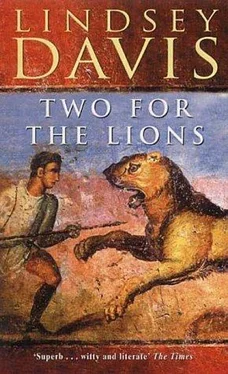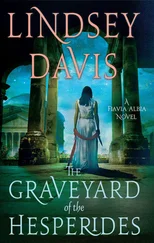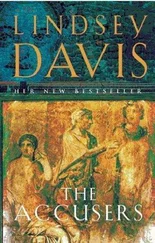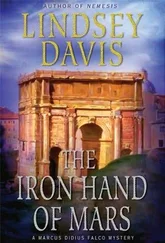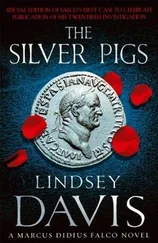Lindsey Davis - Two For The Lions
Здесь есть возможность читать онлайн «Lindsey Davis - Two For The Lions» весь текст электронной книги совершенно бесплатно (целиком полную версию без сокращений). В некоторых случаях можно слушать аудио, скачать через торрент в формате fb2 и присутствует краткое содержание. Жанр: Исторический детектив, на английском языке. Описание произведения, (предисловие) а так же отзывы посетителей доступны на портале библиотеки ЛибКат.
- Название:Two For The Lions
- Автор:
- Жанр:
- Год:неизвестен
- ISBN:нет данных
- Рейтинг книги:5 / 5. Голосов: 1
-
Избранное:Добавить в избранное
- Отзывы:
-
Ваша оценка:
- 100
- 1
- 2
- 3
- 4
- 5
Two For The Lions: краткое содержание, описание и аннотация
Предлагаем к чтению аннотацию, описание, краткое содержание или предисловие (зависит от того, что написал сам автор книги «Two For The Lions»). Если вы не нашли необходимую информацию о книге — напишите в комментариях, мы постараемся отыскать её.
Two For The Lions — читать онлайн бесплатно полную книгу (весь текст) целиком
Ниже представлен текст книги, разбитый по страницам. Система сохранения места последней прочитанной страницы, позволяет с удобством читать онлайн бесплатно книгу «Two For The Lions», без необходимости каждый раз заново искать на чём Вы остановились. Поставьте закладку, и сможете в любой момент перейти на страницу, на которой закончили чтение.
Интервал:
Закладка:
Helena looked dour. She and I had witnessed the supposed adulteress at home, standing up to her husband and teasingly defying his wishes when it suited her. Helena would merely describe that as having an independent streak.
"So is this yet another doe-eyed dame with a bit of brashness in her character, who sleeps with muscle-men for excitement? Or has the beautiful, gentle, utterly unflawed Euphrasia just been slandered appallingly?"
"I'll go and ask her," announced Helena Justina bluntly. Anacrites and I exchanged a faintly nervous glance.
Meanwhile I told how Saturninus had taken a different tack, making out that Calliopus was an unstable figure nursing ludicrous jealousies. He jumped to mad conclusions. He fired off on outrageous schemes for revenge when nothing had been done to him. His barracks was struggling, he refused to admit it, and-if we believed Saturninus, who explained it most reasonably-Calliopus had lost his grip on reality. He too was portrayed as being capable of murder, naturally.
I had asked Saturninus himself why he had removed the original minders from Rumex and locked up the corpse. He wheeled out a plausible tale that he needed to keep the deceased hero's room secure from looters and trophy hunters while he had a chance to interrogate the men who were, after all, his slaves-and to punish their slack vigilance. I asked to interview them. They were produced: flogged, subdued, and unable to tell me anything of use.
I then suggested that Saturninus call in the vigiles, since it was a case of unnatural death. He nodded vaguely. When I made it clear I intended to report it myself; he responded at once, sending out a messenger hotfoot to the local guardhouse. As usual, wrongfooting this man was impossible.
As I discussed all this with Anacrites and Helena I was feeling depressed. Deep pessimism descended on me. Bad signs were already there. The feuding Tripolitanians would supply motives for one another until our hair fell out.
What they said about each other could be entirely true or just as false; their home town rivalry and their failed business ventures were motives for mutual hatred. Even if neither of them were really involved in the death of Rumex, accusations and counter-accusations would fly.
There were inconsistencies. Calliopus had always struck Anacrites and me as too well-organised to engage in impetuous spite; besides, although his business was smaller than his rival's, we knew he was not struggling financially.
As for sexual jealousy, in my opinion Saturninus was fully in control of his domestic life, with a long-term wife from his native shore; if they ran into difficulties he seemed more likely to reach an accommodation with Euphrasia than to explode over a fling, even one with a slave.
I think I knew, even that night, where we would end up. The vigiles would discover nothing to link either man to the crime. Neither would we. Nobody else would be implicated in the killing either.
Helena did visit Euphrasia. To our surprise the woman readily admitted having slept with Rumex" She pointed out she was not alone in that. She seemed to regard having first pick of her husband's men as a perk of her position. She said Saturninus did not like it, though however deeply he cared he had no need to stab the gladiator" He could have matched Rumex in a public fight without quarter, a fight to the death-and earned money from it too. Besides, as an ex-fighter himself; his weapon was not the dainty blade that had been used on Rumex but a short sword, the gladium. Saturninus also would have killed with the arena death thrust.
"That's through the neck, of course," commented Anacrites.
Both lanistae had produced impeccable alibis, Calliopus proving he was at the theatre with his mistress (in his wife Artemisia's absence at the Surrentum holiday home) and Saturninus declaring he had been out to dinner with Euphrasia, which cleared her too. Very gallant. And meticulously convenient-as I had learned to expect.
Alibis were immaterial. Both men owned groups of trained killers. Both knew plenty of murderous types outside their own exercise yards who could be coerced into bad deeds. Both could wield seriously persuasive quantities of cash.
There was one particular suspect to check up on: Calliopus' allegedly rogue bestiarius, Iddibal. I went to interview him. I was told he had been bought out by a rich aunt, and had left Rome.
Now that did smell suspicious. I had seen the supposed "aunt" with him, so I knew she existed. But as a gladiator, Iddibal was a slave. Apparently he had originally been a free volunteer, but his status had changed when he enlisted" When he signed up, he had sworn the oath of complete submission: to the whip, the branding iron, and death. There was no backing out. No lanista would ever let his men hope for escape. Gladiators were held to their gory trade by the knowledge that their only route to freedom was through death: their own, or those of the men and animals they vanquished for the pleasure of the crowd. Once in, only many victories could bring escape; being bought out was never a possibility.
Anacrites was with me when I put this to Calliopus. We told him he was liable to be drummed out of the guild of lanistae for allowing the unthinkable. He squirmed and said the woman had been very persistent, her offer had been financially attractive, and anyway Iddibal had been regarded as a troublemaker, moody and unpopular, ever since he joined. Calliopus even claimed Iddibal had had a wall-eye.
It was nonsense. Early in our investigation, I remembered seeing Iddibal throwing spears among his colleagues with good humour and a very keen aim. I also remembered one of the keepers telling me that when the crocodile who ate another member of staff was put down in the arena it was done by "Iddibal and the others'; that sounded as though in the venatio he had been at least one of the pack, if not actually a leader. Calliopus said no; we thought he was lying. Deadlock again.
We managed to trace Iddibal's movements on the night of the Rumex killing. He had gone, along with the so-called aunt and her servant, all the way to Ostia. We should have caught them there, but the party had actually sailed south in December, a suicidal risk. We could not think how they had persuaded a captain to take them at that time of year. The woman who had plucked Iddibal from the barracks must be absolutely loaded. Anacrites solved it: she owned her own ship" More curious still
We decided Iddibal had run away from a wealthy home, and had now been fetched back by his family" Perhaps his auntie was a real one. He had bunked off from Rome for good, anyway, whether he had in fact gone home to mother, or bunked off with some hot-blooded widow purchasing herself a stud.
"This is sordid," said Anacrites. Trust a spy to be a prude. One further line remained unexplored: the ex-praetor Urtica. Camillus Verus reckoned that the man had not put in an appearance at the Curia for some time. Even the sensational tales about his love life had died down.
Magistrates may retire from politics, but a taste for sleazy behaviour tends to last. Pomponius Urtica might just be lying low to let his reputation pick up again-but the mauling theory seemed more likely to be true.
Once again I travelled out to the Pincian, this time determined to gain admittance if I had to wait all day. This time they told me the truth: Pomponius Urtica was at home, but very sick. The porter stated that he had gout. I said he could talk to me in between groans, and I somehow managed to force my way in as far as the antechamber to the great man's bedroom.
While the attendant doctor was consulted, I noted large quantities of medical equipment, including a bronze stand in the encouraging shape of a skeleton, which had three branches for cupping vessels. Those could be used for a variety of ailments, not least to create diversionary bleeding above a wound. Numerous rolls of bandage were neatly stored on a shelf: There was a smell of pitch-used for sealing holes in flesh, of course. A box with a sliding lid had compartments with hinged lids which contained several ground-up medicines. I stole a pinch of one powder that had been nearly used up and checked it later with Thalia, an expert in exotic substances. "Opobalsamum, I'd say. From Arabia-costs a packet."
Читать дальшеИнтервал:
Закладка:
Похожие книги на «Two For The Lions»
Представляем Вашему вниманию похожие книги на «Two For The Lions» списком для выбора. Мы отобрали схожую по названию и смыслу литературу в надежде предоставить читателям больше вариантов отыскать новые, интересные, ещё непрочитанные произведения.
Обсуждение, отзывы о книге «Two For The Lions» и просто собственные мнения читателей. Оставьте ваши комментарии, напишите, что Вы думаете о произведении, его смысле или главных героях. Укажите что конкретно понравилось, а что нет, и почему Вы так считаете.
